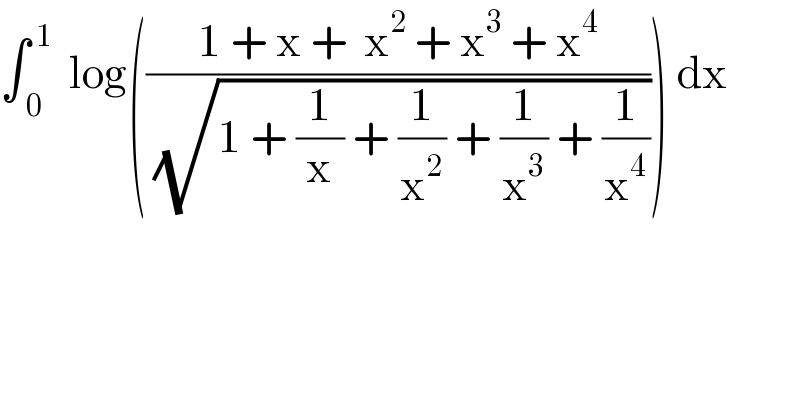
Question and Answers Forum
Question Number 77570 by TawaTawa last updated on 08/Jan/20

Answered by MJS last updated on 08/Jan/20
![=∫_0 ^1 ln (x^2 (√(x^4 +x^3 +x^2 +x+1))) dx= =2∫_0 ^1 ln x dx+(1/2)∫_0 ^1 ln (x^4 +x^3 +x^2 +x+1) dx 2∫_0 ^1 ln x dx=2[x(ln x −1)]_0 ^1 = [lim_(x→0) x(ln x −1) =0] =−2 (1/2)∫_0 ^1 ln (x^4 +x^3 +x^2 +x+1) dx= [α_j =e^(i((2πj)/5)) ; j=1, 2, 3, 4] =(1/2)∫_0 ^1 ln (Π_(j=1) ^4 (x−α_j )) dx= =(1/2)Σ_(j=1) ^4 (∫_0 ^1 ln (x−α_j ) dx)= =(1/2)[Σ_(j=1) ^4 ((x−α_j )ln (x−α_j ))−2x]_0 ^1 =... ...=((√5)/4)ln ((1+(√5))/2) +(5/8)ln 5 +((√(25+10(√5)))/(20))π−2 ⇒ answer is ((√5)/4)ln ((1+(√5))/2) +(5/8)ln 5 +((√(25+10(√5)))/(20))π−4](Q77571.png)
Commented by TawaTawa last updated on 08/Jan/20

Commented by TawaTawa last updated on 12/Jan/20

Commented by MJS last updated on 12/Jan/20

